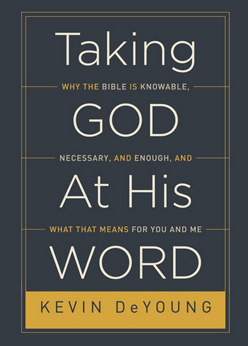Taking God At His Word: Why the Bible Is Knowable, Necessary, and Enough, and What That Means for You and Me by Kevin DeYoung is an excellent book about why we trust the Bible. I thoroughly enjoyed it and highly recommend it. Here at Brookville Baptist we are always talking about the Bible. We can’t get enough of it and in this book you get introduced to many of the reasons why. DeYoung’s writing is fresh, engaging and thought-provoking. This little book is a very readable introduction to Scripture’s teaching about Scripture. John MacArthur said, “This is a brilliant, succinct, yet thorough study of the authority and sufficiency of Scripture, based on what Scripture says about itself. Clarity and passion are the distinguishing marks of Kevin DeYoung’s writing, and this may be his finest, most important work yet.” I heartily agree. Reading this book gave me even more hunger to read the Bible. It is well worth your time.
In eight short chapters, DeYoung traces the basic contours of what the Bible teaches about the Bible. He begins in chapter 1 with a brief exposition of Psalm 119, because “The goal of this book is to get us believing what we should believe about the Bible, feeling what we should about the Bible, and to get us doing what we ought to do with the Bible”. Chapter 2 unpacks 2 Peter 1:16–21’s teaching that Scripture is sure, steady, and unerring, laying theological groundwork for the rest of the book.
The next four chapters each expound one of the classically affirmed attributes of Scripture: sufficiency, clarity, authority, and necessity. These might seem like abstract terms, but DeYoung brings the cookies all the way to the bottom shelf by using simple, concrete language and showing how each of these features of Scripture is crucial for the Christian life.
Chapter 7 unpacks Jesus’ own beliefs about Scripture, focusing especially on his statement that “Scripture cannot be broken” in John 10:35. And chapter 8 concludes with an exposition of 2 Timothy 3:14–17 which cements the book’s doctrinal foundation and issues a call to continue in the Scriptures.
This book is clear, concise, accessible, evenhanded, precise, and practical. The Bible is God’s book, a fact we are reminded of frequently in the book. Consequently, to trust completely in the Bible is to trust in the character and assurances of God more than we trust in our own ability to reason and explain.
What DeYoung presents in this book is the posture we should bring to Scripture and gain from Scripture: humble submission, reverent trust, and eager expectation that the God who spoke these words will use these words to remake us in his image. My faith was nourished and deepened by reading this book. I think yours will be too.
Here are some great quotes to give you an appetite for this read,
“The Word of God is more than enough to accomplish the work of God in the people of God.”
“You do not need another special revelation from God outside the Bible. You can listen to the voice of God every day. Christ still speaks, because the Spirit has already spoken. If you want to hear from God, go to the book that records only what he has said. Immerse yourself in the word of God. You will not find anything more sure.”
“The Scriptures are our spectacles (to use Calvin’s phrase), the lenses through which we see God, the world, and ourselves rightly.”
“No one who truly delights in God’s word will be indifferent to the disregarding of it.”
“The most effective means for bolstering our confidence in the Bible is to spend time in the Bible.”
“You can think too highly of your interpretations of Scripture, but you cannot think too highly of Scripture’s interpretation of itself. You can exaggerate your authority in handling the Scriptures, but you cannot exaggerate the Scriptures’ authority to handle you. You can use the word of God to come to wrong conclusions, but you cannot find any wrong conclusions in the word of God.”
“God’s Word is final. God’s Word is understandable. God’s Word is necessary. God’s Word is enough.”



0 Comments